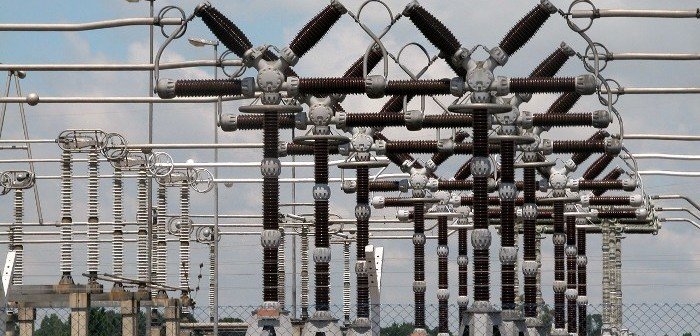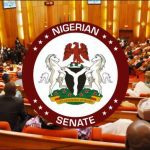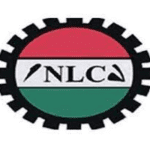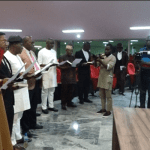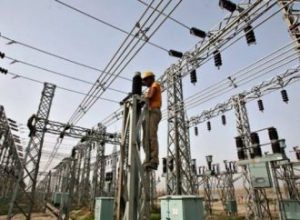 The Socio-Economic Rights and Accountability Project, SERAP has accused the three previous administrations of squandering eleven trillion naira electricity fund.
The Socio-Economic Rights and Accountability Project, SERAP has accused the three previous administrations of squandering eleven trillion naira electricity fund.
SERAP said the money, which comprises public funds, private equity and social investment, was misspent during Presidents Olusegun Obasanjo, Umar Yaradua and Goodluck Jonathan’s regimes.
In a 65-page report launched in Lagos on Wednesday, the group called for a probe into the alleged squandering and a thorough investigation into the alleged government funding of privatized power sector.
The report further said the country’s Electric Power Sector Reform Act of 2005 have not yielded the desired results due to what it called corruption and impunity of perpetrators, regulatory lapses and policy inconsistencies.
 The Socio-Economic Rights and Accountability Project, SERAP has accused the three previous administrations of squandering eleven trillion naira electricity fund.
The Socio-Economic Rights and Accountability Project, SERAP has accused the three previous administrations of squandering eleven trillion naira electricity fund.
SERAP said the money, which comprises public funds, private equity and social investment, was misspent during Presidents Olusegun Obasanjo, Umar Yaradua and Goodluck Jonathan’s regimes.
In a 65-page report launched in Lagos on Wednesday, the group called for a probe into the alleged squandering and a thorough investigation into the alleged government funding of privatized power sector.
The report further said the country’s Electric Power Sector Reform Act of 2005 have not yielded the desired results due to what it called corruption and impunity of perpetrators, regulatory lapses and policy inconsistencies.
 The Socio-Economic Rights and Accountability Project, SERAP has accused the three previous administrations of squandering eleven trillion naira electricity fund.
The Socio-Economic Rights and Accountability Project, SERAP has accused the three previous administrations of squandering eleven trillion naira electricity fund.
SERAP said the money, which comprises public funds, private equity and social investment, was misspent during Presidents Olusegun Obasanjo, Umar Yaradua and Goodluck Jonathan’s regimes.
In a 65-page report launched in Lagos on Wednesday, the group called for a probe into the alleged squandering and a thorough investigation into the alleged government funding of privatized power sector.
The report further said the country’s Electric Power Sector Reform Act of 2005 have not yielded the desired results due to what it called corruption and impunity of perpetrators, regulatory lapses and policy inconsistencies.
 The Socio-Economic Rights and Accountability Project, SERAP has accused the three previous administrations of squandering eleven trillion naira electricity fund.
The Socio-Economic Rights and Accountability Project, SERAP has accused the three previous administrations of squandering eleven trillion naira electricity fund.
SERAP said the money, which comprises public funds, private equity and social investment, was misspent during Presidents Olusegun Obasanjo, Umar Yaradua and Goodluck Jonathan’s regimes.
In a 65-page report launched in Lagos on Wednesday, the group called for a probe into the alleged squandering and a thorough investigation into the alleged government funding of privatized power sector.
The report further said the country’s Electric Power Sector Reform Act of 2005 have not yielded the desired results due to what it called corruption and impunity of perpetrators, regulatory lapses and policy inconsistencies.
 The Socio-Economic Rights and Accountability Project, SERAP has accused the three previous administrations of squandering eleven trillion naira electricity fund.
The Socio-Economic Rights and Accountability Project, SERAP has accused the three previous administrations of squandering eleven trillion naira electricity fund.
SERAP said the money, which comprises public funds, private equity and social investment, was misspent during Presidents Olusegun Obasanjo, Umar Yaradua and Goodluck Jonathan’s regimes.
In a 65-page report launched in Lagos on Wednesday, the group called for a probe into the alleged squandering and a thorough investigation into the alleged government funding of privatized power sector.
The report further said the country’s Electric Power Sector Reform Act of 2005 have not yielded the desired results due to what it called corruption and impunity of perpetrators, regulatory lapses and policy inconsistencies.
 The Socio-Economic Rights and Accountability Project, SERAP has accused the three previous administrations of squandering eleven trillion naira electricity fund.
The Socio-Economic Rights and Accountability Project, SERAP has accused the three previous administrations of squandering eleven trillion naira electricity fund.
SERAP said the money, which comprises public funds, private equity and social investment, was misspent during Presidents Olusegun Obasanjo, Umar Yaradua and Goodluck Jonathan’s regimes.
In a 65-page report launched in Lagos on Wednesday, the group called for a probe into the alleged squandering and a thorough investigation into the alleged government funding of privatized power sector.
The report further said the country’s Electric Power Sector Reform Act of 2005 have not yielded the desired results due to what it called corruption and impunity of perpetrators, regulatory lapses and policy inconsistencies.
 The Socio-Economic Rights and Accountability Project, SERAP has accused the three previous administrations of squandering eleven trillion naira electricity fund.
The Socio-Economic Rights and Accountability Project, SERAP has accused the three previous administrations of squandering eleven trillion naira electricity fund.
SERAP said the money, which comprises public funds, private equity and social investment, was misspent during Presidents Olusegun Obasanjo, Umar Yaradua and Goodluck Jonathan’s regimes.
In a 65-page report launched in Lagos on Wednesday, the group called for a probe into the alleged squandering and a thorough investigation into the alleged government funding of privatized power sector.
The report further said the country’s Electric Power Sector Reform Act of 2005 have not yielded the desired results due to what it called corruption and impunity of perpetrators, regulatory lapses and policy inconsistencies.
 The Socio-Economic Rights and Accountability Project, SERAP has accused the three previous administrations of squandering eleven trillion naira electricity fund.
The Socio-Economic Rights and Accountability Project, SERAP has accused the three previous administrations of squandering eleven trillion naira electricity fund.
SERAP said the money, which comprises public funds, private equity and social investment, was misspent during Presidents Olusegun Obasanjo, Umar Yaradua and Goodluck Jonathan’s regimes.
In a 65-page report launched in Lagos on Wednesday, the group called for a probe into the alleged squandering and a thorough investigation into the alleged government funding of privatized power sector.
The report further said the country’s Electric Power Sector Reform Act of 2005 have not yielded the desired results due to what it called corruption and impunity of perpetrators, regulatory lapses and policy inconsistencies.

